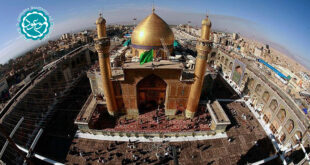The Holy Qur’an has used the word fiṭrat (nature) in Sūrah Rūm where it has introduced religion as an innate [fiṭrī] affair. It seems that Islamic researchers have been inspired by this Qur’anic verse in usage of the term fiṭrat:
“So set thy face to the pure religion of Allah; this is the fiṭrat (nature) upon which Allah has created the humankind. The creation of Allah is immutable. This is the eternal religion, but most people do not know.”16
This verse states the fact that religion is an innate attribute and that God has created humanity’s essence based upon this attribute. Even though this verse does not explicitly speak of innate realization of God, we may consider it a confirmation of this fact because, if the intent of “religion” in this verse is the primary teachings and pillars of faith in Islam, then surely this includes belief in the existence of God. Another possibility is that the intent of “religion” is submission and humility towards God and worshiping Him. In this case, the verse indicates the innateness of worshiping God and since worship of an unknown being is not possible, innate theism necessitates innateness of the awareness of God’s existence.
Another verse that can be cited as a confirmation of innate realization of God is the verse of Mīthāq (covenant):
“And when your Lord took from the loins of the children of Adam their seed and made them their own witness, asking that: “Am I not your Lord?” They said: “Yes, we bear witness [to this fact]”—lest you should say on the Day of Resurrection: “Surely we were unaware of this [fact].”17
What can be briefly understood from the verse of Mīthāq is that in one stage of creation, God gathered all the humans who would live in the world from the Beginning until the Day of Resurrection and secured their acknowledgement of His Lordship. The purpose for requesting this confession was that unbelievers and polytheists later could not bring the excuse that they were unaware and ignorant.18
In addition, in several verses, the Holy Qur’an informs of the fact that the God-perceiving nature [fiṭrat] of humans sometimes becomes stagnant and only awakens at critical moments:
“And when they embark in a ship they call upon Allah with sincerity, but when they are delivered to land and are saved, then [again] they associate others with Him.” 19
These verses also show that the Qur’an confirms humankind’s innate knowledge of the existence of God.
In addition, among the traditions of the Immaculates, there is mention of the innate ability of humankind to perceive God. For example, in exegesis of verse 30 of Sūrah Rūm, Imam Bāqir (‘a) has declared:
“God has established in the nature of humans understanding of Himself.”20
2. The Way of Experience
Sometimes through accurate observation and meditation concerning the qualities and relations between empiric phenomena one may be guided towards cognizing the existence of God and understanding of His attributes, including Absolute Knowledge, Wisdom, and Power. This method is called the way of experience because it is based upon observation of the natural world and empirical analysis of natural phenomena.21 Because of the unique advantages of this method, the Holy Qur’an has special regard towards it and thus in many verses it calls upon humans to contemplate the phenomena of the world around them as genetic [takwīnī] proofs and signs of God. Some Islamic researchers have developed an argument of the existence of God based upon one aspect of the natural world—the order and discipline prevailing upon natural objects—which is called the argument of design or order [burhān al-naẓm].22 The argumentation of order is an obvious example of what we have termed the way of experience.
“Evidential Understanding” in the Qur’an and Traditions
In many parts of the Qur’an, there are verses that describe various natural phenomena, regarding such phenomena as evidence and signs of the existence of God and calling upon humans to contemplate and meditate upon them. Understanding God through the genetic [takwīnī] signs in Creation, which is a prime example of the experiential method of cognition of God, is sometimes called evidential or extroversive understanding.23
A number of verses call upon humans to contemplate the genetic [takwīnī] signs of God. These verses consider the existing order and organization in the world and in humankind a justification and beacon that may guide the wise towards the Divine Origin of the world:
“Surely in the creation of the heavens and earth and in the alternation of night and day there are [convincing] signs for people possessed of minds.”24
“And upon the earth there are [persuasive] signs for those having sure faith; and in yourselves; so do you not see?”25
Furthermore, large selections of Qur’anic verses indicate a specific phenomenon and represent it as a sign of the existence of God and His Divine Knowledge and Power. These verses are so extensive that even enumerating a small number of them necessitates much time.26
In compliance with the Holy Qur’an, the leaders of Islam have strenuously emphasized “evidential understanding” of God. For example, in a comprehensive narration addressed to one of his disciples, Imam Sādīq (‘a) stated:
“O Mufaḍal! The first edification and rationale of the existence of God—the Almighty, the Glorious—is the formation, assembly of elements, and systematization of this world. Thus if you deeply and properly contemplate the workings of the world using your intellect and wisdom, you will surely see it as a home in which all of the needs of God’s servants are ready and gathered. The sky has been raised like a ceiling; the earth has been spread like a carpet; the stars have been arranged like lamps; gems have been hidden inside the earth as stockpiles; and everything has been set in its proper place. And humankind is the one who has been bestowed this home and everything within it. All kinds of plants and animals have been prepared to provide their needs and further their interests. All this shows that the world has been created through precise and intelligent quantification, order, proportion, and coordination. It has but one Creator and He is the One who has formed, ordered, and coordinated its elements.”27
 Mouood Mouood English Edition
Mouood Mouood English Edition




